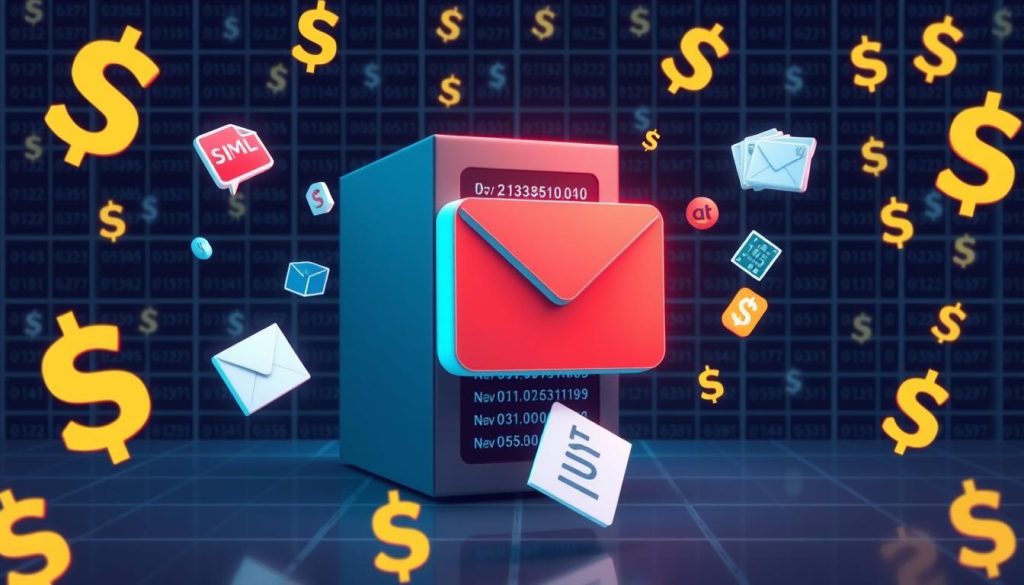Email is a key tool in digital marketing for businesses to reach their audience. We’ll look at the costs that affect your email campaigns. This includes domain prices, SMTP server costs, and email hosting fees. We aim to help you make the most of your email marketing budget and get the best return on investment (ROI).
Key Takeaways
- Understand the critical cost components of bulk email marketing, including domain pricing, SMTP server expenses, and email hosting fees.
- Discover strategies to maximize cost-effectiveness in your bulk email campaigns through list segmentation and automation.
- Learn how to allocate your email marketing budget effectively to drive the best results.
- Explore best practices for successful bulk email campaigns that deliver measurable returns.
- Gain insights into the factors influencing domain costs and the differences between shared and dedicated email hosting.
Introduction to Bulk Email Marketing
In today’s world, bulk email marketing is key for businesses to connect with many people. It helps build customer relationships and boost sales. Bulk emails send messages to lots of contacts at once, making sure they hear what matters most.
Understanding the Importance of Bulk Email Campaigns
Bulk email marketing is vital in today’s marketing world. It keeps businesses in touch with their audience and shares important info. By using bulk email, companies can grow their brand, engage more customers, and get people to take action.
Benefits of Effective Bulk Email Strategies
- Reach a wide audience efficiently: Bulk email lets you send your message to many contacts at once, reaching more people.
- Improve customer retention: Regular emails keep your current customers happy and loyal.
- Boost lead generation: Interesting bulk emails can draw in new leads and turn them into customers.
- Measurable performance: You can track how well your emails do, helping you make better choices.
- Cost-effective marketing: Bulk email is cheaper than old-school marketing ways to get your message out.
Knowing how great bulk email campaigns are, businesses can make their marketing better. This leads to lasting success.
Email Marketing Costs: An Overview
Understanding the costs of email marketing is key for planning your budget well. It’s a cost-effective way to connect with your audience. But, you need to know the different expenses involved.
The main cost is the email marketing costs itself. This includes fees for email service providers. These fees change based on your subscriber count, needed features, and email volume. You also need to think about the cost of getting email lists or leads.
Creating cost-effective email campaigns is another big expense. This includes time and resources for making content, designing, and personalizing. Good email content can make your campaigns more effective and worth the investment.
When planning your email marketing budget, remember other costs too. This includes website hosting, domain registration, and SMTP server fees. These are important for sending and succeeding with your emails.
Knowing all the costs of email marketing helps you plan better. You can then use your resources well, make your campaigns more impactful, and reach your marketing goals.
| Cost Component | Description | Estimated Range |
|---|---|---|
| Email Service Provider Fees | Fees charged by email service providers based on subscriber count and email volume | $0 – $500+ per month |
| Email List Acquisition | Costs associated with building and maintaining an email subscriber list | $0 – $5,000+ per year |
| Content Creation | Expenses for developing and designing email content, including copywriting, graphics, and personalization | $500 – $5,000+ per campaign |
| Website Hosting and Domain | Costs for hosting your website and registering/renewing your domain name | $50 – $500+ per year |
| SMTP Server | Fees for using a dedicated SMTP server to ensure reliable email delivery | $10 – $100+ per month |
“Email marketing is one of the most cost-effective ways to reach and engage with your target audience. By carefully planning your budget, you can maximize the return on your email marketing investment.”
Domain Pricing: Selecting the Right Domain
Choosing the right domain for your email marketing campaigns is crucial. It can greatly affect your costs. When looking at domain options, consider what affects pricing. This includes domain extensions and brand recognition. Knowing these can help you choose wisely and save money.
Factors Influencing Domain Costs
Domain costs vary based on several factors. Key elements include:
- Domain extension: The type of top-level domain (TLD) like .com, .org, or .net affects price. Some extensions are more sought after and cost more.
- Brand recognition: Domains with well-known brands or high search engine ranking are pricier. They’re in demand and offer marketing benefits.
- Scarcity and competition: Short, memorable, or niche-specific domains are pricey. They’re rare and highly sought after.
Domain Registration and Renewal Fees
Remember, there are ongoing costs for domain registration and renewal. These fees change based on the registrar, domain type, and any deals. Knowing these costs is key for planning your email marketing campaigns.
By understanding what affects domain pricing and the costs of registration and renewal, you can make smart choices. These choices will fit your email marketing budget and help you meet your campaign goals.
SMTP Server Expenses: A Crucial Component
SMTP (Simple Mail Transfer Protocol) servers are key for bulk email marketing. They help send your messages reliably to your audience. Knowing the costs of SMTP servers is vital for a budget-friendly email marketing plan.
The main costs for SMTP servers are:
- Server Hosting Fees: The cost to host and keep the SMTP server varies by provider and service level.
- Bandwidth and Storage Costs: The data transfer and storage needed for your emails can greatly affect costs.
- Email Deliverability Services: Some providers offer extra services like spam filtering and reputation management. These can cost more but help your emails get delivered better.
To save on SMTP server costs and run cost-effective email campaigns, try these tips:
- Look for and compare SMTP service providers to find the best and most affordable one for your needs.
- Think about how much email you send and how much storage you need to pick the right SMTP server plan.
- Use email deliverability services only if they really help by boosting your email delivery rates.
- Include SMTP server costs in your email marketing budget planning for a balanced and lasting approach.
By managing SMTP server costs, you can make your bulk email marketing better. This ensures your email campaigns are cost-effective and effective, giving you the best results.

“Maximizing the cost-effectiveness of your SMTP server is essential for building a sustainable and successful email marketing program.”
Bulk Email Marketing Strategies: A Cost Breakdown of Domains, SMTP, and Hosting
When planning your bulk email marketing campaigns, it’s key to understand the costs of domains, SMTP, and hosting. Knowing these expenses helps you find ways to spend less while still reaching your goals.
Domains: The Foundation of Your Email Infrastructure
The cost of domains varies based on the type, how long you register it for, and any extra features. A basic .com domain usually costs between $10 and $15 a year. But, more unique or premium domains can be much pricier.
SMTP Servers: The Backbone of Your Bulk Emails
SMTP, or Simple Mail Transfer Protocol, is essential for sending emails. The cost depends on how many emails you send and the service level you need. SMTP providers often have different plans for businesses of all sizes.
Hosting: Powering Your Email Campaigns
Hosting your email system can cost a lot, depending on the plan, storage, and support needed. Basic shared hosting starts at $5 a month. But, dedicated servers can cost hundreds or thousands a month.
By looking closely at these costs and finding ways to save, you can make your bulk email marketing more affordable. This way, you can get the most out of your investment.
Remember, smart planning and budgeting in email marketing can help you reach your business goals without spending too much.
Email Hosting Fees: Understanding the Options
Email hosting is key for bulk email marketing and affects your costs. Knowing the difference between shared and dedicated hosting is vital. It helps in planning a budget-friendly email marketing strategy.
Shared vs. Dedicated Email Hosting
Choosing between shared and dedicated hosting impacts your costs. Shared hosting is cheaper but has limits on storage, bandwidth, and delivery. Dedicated hosting gives you a private server for better control and performance. It’s pricier but good for big email marketing needs or strict rules.
| Feature | Shared Email Hosting | Dedicated Email Hosting |
|---|---|---|
| Cost | Lower email hosting fees | Higher email hosting fees |
| Control | Limited control over server settings | Full control over server settings |
| Customization | Limited customization options | Highly customizable |
| Performance | May experience performance issues due to shared resources | Dedicated resources for optimal performance |
| Compliance | May not meet strict compliance requirements | Suitable for businesses with strict compliance needs |
When picking between shared and dedicated hosting, think about your email marketing needs and budget. Also, consider any strict rules your business must follow. Weighing cost against features helps you choose wisely for your email marketing budget and campaigns.

Cost-Effective Bulk Emailing Strategies
Bulk email marketing has more than just initial costs. To get the most out of your campaigns, explore different strategies. Focus on segmenting your email list and using automation and personalization.
Segmenting Your Email List
Segmenting your email list is a powerful way to make your marketing more cost-effective. By dividing your contacts into specific groups, you can send more tailored messages. This leads to better engagement and a higher return on investment.
Some effective ways to segment include:
- Demographic factors like age, gender, location, and interests
- Behavioral data such as past purchase history, website interactions, and email engagement
- Psychographic traits like values, attitudes, and lifestyle preferences
Leveraging Automation and Personalization
Automation and personalization are also key to cost-effective emailing. Automating tasks like welcome emails and birthday messages saves time and resources. It also gives subscribers a more personalized experience.
Using personalization techniques like dynamic content and subject line optimization makes your emails more relevant. This leads to higher conversion rates and a better return on your email marketing budget.
“Segmenting your email list and leveraging automation and personalization are two of the most powerful ways to make your bulk email campaigns more cost-effective.”
Email Marketing Budget Planning
Planning your email marketing budget is key. It helps make sure your campaigns are both effective and affordable. We’ll look at how to plan your email marketing budget and allocate resources for cost-effective email campaigns.
Prioritize Your Goals
First, define what you want from your email marketing. Do you want to boost brand awareness, get more leads, or engage customers better? Knowing your goals helps you spend your budget wisely. This way, you focus on what matters most in your email marketing.
Analyze Your Audience
Understanding who you’re sending emails to is crucial. Look at demographics, interests, and buying habits to find the best way to reach them. This helps you spend your budget where it will have the biggest impact.
Leverage Cost-Effective Strategies
Look for cost-effective email marketing strategies to stretch your budget. Using list segmentation, automation, and personalization can make your emails more targeted and engaging. This way, you can send great content without spending too much.
| Strategy | Benefits | Cost-Effectiveness |
|---|---|---|
| List Segmentation | Improved targeting and relevance | Reduces waste and increases ROI |
| Automation | Streamlined workflows and consistent messaging | Saves time and resources |
| Personalization | Enhanced customer engagement and loyalty | Boosts conversion rates and customer lifetime value |
By using these strategies, you can allocate resources effectively. This makes the most of your email marketing budget planning.
“Effective budget planning is the foundation of a successful email marketing strategy. By aligning your resources with your goals, you can drive impactful and cost-efficient campaigns that deliver real results.”
Best Practices for Successful Bulk Email Campaigns
Creating effective bulk email campaigns needs a strategic plan. By sticking to best practices, you can boost your email marketing success. Here are some important guidelines to remember:
- Maintain a Clean Email List – Keep your email list up to date to ensure it works well. Remove inactive subscribers to improve your reputation.
- Optimize Email Content – Make your subject lines and content engaging. Use good designs to grab attention and encourage action.
- Leverage Personalization – Use dynamic content and data to make emails feel special and relevant to each person.
- Automate Your Campaigns – Use email automation tools to make your work easier. Schedule and send campaigns based on how people interact with your emails.
- Monitor and Analyze Performance – Keep an eye on important metrics like open rates and conversions. This helps you see what works and what doesn’t, so you can do better.
By following these tips, you’ll be on the path to making successful bulk email campaigns. These campaigns will help you achieve your goals and make the most of your email marketing budget.
“The key to successful email marketing is finding the right balance between personalization and automation.”
Conclusion
In this guide, we’ve looked at the costs of successful bulk email marketing campaigns. We’ve seen how the prices of domains, SMTP servers, and email hosting affect our budgets. This knowledge helps us plan better and get the most out of our email marketing.
Successful bulk email marketing strategies depend on smart resource use. By understanding the cost breakdown of domains, SMTP, and hosting, we can cut costs. This ensures our email marketing budget planning supports our business goals.
Looking forward, we must keep improving our strategies. We should stay updated with new trends and technologies. With a focus on data and cost-effectiveness, we can fully use bulk email marketing. This will help us achieve real results for our businesses.
FAQ
What are the key cost factors involved in executing bulk email marketing campaigns?
Key costs include domain pricing, SMTP server expenses, and email hosting fees. Knowing these costs helps plan and manage your budget well.
How can I select the right domain for my email marketing campaigns?
Look at domain extensions, brand recognition, and fees for registration and renewal. The right domain affects your email marketing costs.
What are the expenses associated with SMTP servers for bulk email marketing?
SMTP servers are key for bulk email marketing. Costs include server fees, maintenance, and software or infrastructure. Cutting these costs is crucial for affordable campaigns.
How do email hosting fees differ between shared and dedicated solutions?
Fees vary between shared and dedicated hosting. Shared hosting is cheaper but offers less control. Dedicated hosting costs more but gives more customization. Choose based on your needs.
What strategies can I use to make my bulk email campaigns more cost-effective?
To save money, segment your list, use automation and personalization, and plan your budget well. These steps can boost your campaign’s value.
How can I effectively plan and allocate my email marketing budget?
Plan by analyzing costs like domains, SMTP, and hosting. Then, allocate based on your goals and needs. This approach maximizes your investment.
What are the best practices for running successful bulk email campaigns?
For success, keep your list healthy, optimize content, track performance, and refine strategies. These steps enhance your campaign’s effectiveness and ROI.


